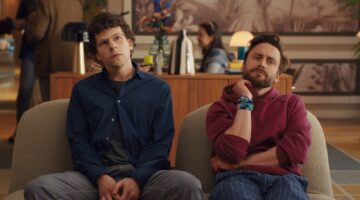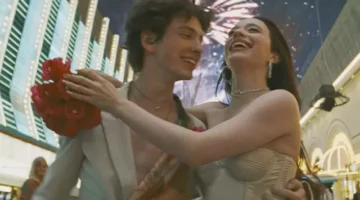Tropic Sprockets / Blinded by the Light
By Ian Brockway
“Blinded by the Light” by Gurinder Chadha (Bend It Like Beckham) is based on the life of Sarfraz Manzoor, who has seen Bruce Springsteen 150 times. Springsteen is a spiritual mentor of Manzoor’s. Though the film is predictable and somewhat conventional in its theme of parental authority, it is bouncy and vivid with a festive heart.
Javed (Viveik Kalra) is a loner in Luton, England in the 1980s. Margaret Thatcher rules the roost and things are extremely conservative. Musically The Pet Shop Boys and The Human League are popular. Javed writes constantly in tune with his feelings. As they are from Pakistan, Javed’s father wants to ensure his son has a respectable job, latching on to the status quo. He urges him to abandon writing.
But Javed cannot. He journeys through high school like one stricken. Because he lives in his head, he doesn’t quite fit in, but he’s cute and approachable.
Packs of racist boys attack him.
One day, a cheerful boy, Roops (Aaron Phagura), sees his melancholia and gives him a two cassettes of Springsteen, telling him The Boss will change his life.
Javed is skeptical. During a family argument, Javid despairs. He rips up his poetry during a rainstorm. Javed presses play on his Walkman and a universe of possibility goes off inside his head.
Though the father (Kulvinder Ghir) is stereotypically drawn, the main actors Kalra and Aaron Phagura hold the film together. Both are entertaining and effervescent. Hayley Atwill is solid too, as the love interest, and character actor Rob Brydon (The Trip) gives an amusing turn as an older Springsteen aficionado.
The charm of the film is in its easy tone and its light bearing. The visualization of Springsteen’s lyrics as something both electric and avian, delivered by meteorological trials of the heart, is charming and evocative and the best aspect of the film.
Though “Blinded by the Light” is a bit Disneyfied in its feel-good tone (there is an all too sentimental montage of everyone dancing in the street) it points to the very real potential of music to change human rhythms pointing to other cultures and perspectives. In our current xenophobic political climate where fear of immigration is transmitted in our news outlets incessantly, this cannot be understated.
Music (and by extension, film) is the great equalizer.
Write Ian at [email protected]
[livemarket market_name="KONK Life LiveMarket" limit=3 category=“” show_signup=0 show_more=0]










No Comment